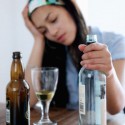Charity’s campaign to steer children away from alcohol
A Report published into the drinking habits of secondary school children makes for disturbing reading.
The NHS Information Centre asked 7,798 pupils, mostly aged from 11 to 15, how much they drank and where they got their alcohol.
More than half, 52 per cent, said they had drunk an entire alcoholic drink. Most had got it from their friends or parents.
Six per cent had consumed an average of 14.6 units a week – the recommended weekly limit for an adult woman is between 14 and 21 units.
The figures do not surprise Terry Martin, a trustee of Essex-based charity AlcoHELP.
Mr Martin, 57, said: “Of the 1,000 children I spoke to a fortnight ago, only ten put up their hands to say they hadn’t drunk any alcohol.
“When it comes to drinking alcohol, a fifth of 11-year-olds is normal, rising to one in three for 13-year-olds.
“The younger we can talk to children, the better.”
Mr Martin, from Finchingfield, set up AlcoHELP with Debby Peirson and Nigel Bangard in 2003. The three had previously been in rehabilitation for drink-related problems.
For Mr Martin, the demons of drink not only affected his own life, but stole the life of his sister, Kate, who died aged 38. She left three children.
It was not until six years later that her brother realised he too had a problem and turned his life around.
Mr Martin, an accountant for a Braintree firm, has been sober for nine years and is dedicated to his crusade to helping prevent young people from experiencing what he has gone through.
AlcoHELP works in five of the county’s 12 districts, including Braintree.
The trustees run their own education programme for ten to 14-year-olds and are involved in other youth initiatives, such as Crucial Crew and the 2Smart roadshow.
Their presentations involve finding out about youngsters’ attitudes to alcohol and looking at the impact of booze on young bodies, including the effect it has on destroying brain cells.
They aim to make a difference through education and believe in prevention rather than cure.
Mr Martin said there is very little help available for children with an alcohol problem, other than seeing their GP, and he would like a dedicated phone line or therapy sessions for under-18s.
Mr Martin said the fact all three trustees have had first-hand experience of alcohol abuse makes the children sit up and listen.
He said: “I was about 13 when I started drinking. My sister started when she was 13. The younger you start to drink, the more likely you are of developing a problem.
“I came from a family where there have been heavy drinkers. The drink was there. When I was a child in the 1960s, drinking was a lot more socially acceptable than it is nowadays.”
Mr Martin said he drank an abnormal amount of alcohol since the time he started drinking, and he mixed with older children and adults.
He said: “Vodka is the drink of the alcoholic. I had a bottle a day plus, easily. I went into rehab in September 2000 and haven’t touched a drop since.
“That’s not the same story for everybody. A high number of people die. I’m very lucky to be here today.
“My sister was 38 when she died in 1994. There wasn’t the education then as there is now. People were very much in denial about her drinking, as she was.
“For a long time, it was considered she had anorexia because wasn’t eating. She weighed about six stone. In the end, her liver gave out. They wouldn’t give her a liver transplant because she was an alcoholic.
“I was still drinking, but it didn’t stop me. You would think something like that would make you think twice.”
The turning point was when Mr Martin realised he could not stop taking alcohol.
He said: “I went to the Priory in Chelmsford for 28 days. It worked immediately and I had a total change of lifestyle and attitude.
“A lack of self-esteem is one of the major factors in any person who has got alcohol problems.
“Alcohol is a drug and we’ve come to realise that more recently. If alcohol was invented now, it would be a class A drug. The culture around drinking is such that it used to be considered just a thing to do. Now we know the medical side, how it harms the brain.”
When he asks children why they drink, the inevitable answers are to look “hard”, “cool” or “smart”.
He added: “You can see the drinkers. They are boisterous and start to get lairy. The ones who will never drink are quiet and interested in sport.
“The ones in the middle could go either way.”
Mr Martin said peer pressure, hereditary factors, and because some parents give their children alcohol, are contributory factors to alcoholism in the young.
He said the Government and supermarkets also play their part, with the affordable price of alcohol in shops proving tempting to youngsters.
AlcoHELP agreed with recommendations made earlier this year by Sir Liam Donaldson, the Government’s chief medical adviser, to ban drinks being sold for less than 50p per unit of alcohol.
The proposals were rejected by the Government.
source: Gazette

